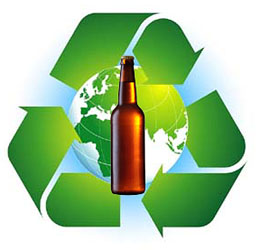 Let’s face it: brewing isn’t the most eco-friendly hobby. For every bottle of beer brewed, it takes a gallon of water or more to make it. Even on a commercial scale, brewers have had to figure out ways to conserve water and process their waste.
Let’s face it: brewing isn’t the most eco-friendly hobby. For every bottle of beer brewed, it takes a gallon of water or more to make it. Even on a commercial scale, brewers have had to figure out ways to conserve water and process their waste.
Luckily, there are several steps homebrewers can take to conserve raw materials and make their hobby more eco-friendly. You might even save a few bucks along the way!
- Compost – This is one of the easiest ways to make brewing more eco-friendly. Spent grain, trub, and yeast can all be added to the compost heap. After decomposing, these materials can be mixed into your garden soil or used as mulch. That’s money saved on both fertilizer and bed dressings! Plus, what goes in the compost heap stays out of the landfill.
- Buy organic ingredients – Ingredients that are grown organically are free from pesticides and aren’t genetically modified. This means that fewer pesticides are washed into the water system and biodiversity is ensured. The jury’s out on whether organic beers taste better, but you can rest assured that beers made with organic ingredients will have a much less negative impact on our environment. Besides, good karma tastes great in an IPA.
- Use an eco-friendly cleaner – One-Step No-Rinse Cleanser uses no chemicals, just oxygen to clean your homebrewing equipment. Keeping those chemicals out of your drains and off your equipment means everyone wins.
- Grown your own – If your region is suited for growing hops or grains, go for it! You can also grow some of your own herbs spices, or fruits for added homegrown flavor. The more you grow, the less is spent transporting ingredients. Check out the Homebrewer’s Garden for some great tips on how to get started sustaining your homebrewing self-reliance.
- Conserve water– Brewing requires a lot of water, both for the beer itself and for cleaning before and after brewing. There are several ways to minimize water use:
- Use a bottle and carboy washer for a high-pressure/low-volume rinse.
- Reuse cleaning/sanitizing water as much as possible. For example, if I’m soaking my mash tun or bottling bucket in One Step, I put everything else that will fit in there too: beer bottles, brushes, hydrometer. I’ll then run the cleaner water out through the racking cane and siphoning hose. Save the water for cleaning at the end of brew day. If there’s any left over, use it to do the dishes!
- Heating – Natural gas is more efficient than coal-fired electricity, so using a burner rather than an electric stovetop will save you kilowatts on your electric bill and time in the boiling process. Another way to get more efficient with your water hearing is to insulate your mash tun. You can build your own jacket using materials from the hardware store, but be careful around the flame! Solar hot water is another option prior to firing up the burner. If you can get the water halfway there, that’s less energy needed for heating water.
- Buy in bulk – Bulk purchases, such as this 50 lb. bag of Briess 2-Row, mean less packaging, and it saves you money! Plus, you have a built-in excuse to brew more beer. Win, win!
Homebrewing is an art, one to be constantly improved upon. In an excellent blog post, Deena Shanker writes that “Environmentalism … goes hand in hand with the art of beer making.” Adopt even a few of these eco-friendly ideas, put a delicious home brew in your hand, and cheers to Mother Earth!
——————————————————————————————————-
David Ackley is a beer writer, brewer, and self-described “craft beer crusader.” He holds a General Certificate in Brewing from the Institute of Brewing and Distilling and is founder of the Local Beer Blog.
